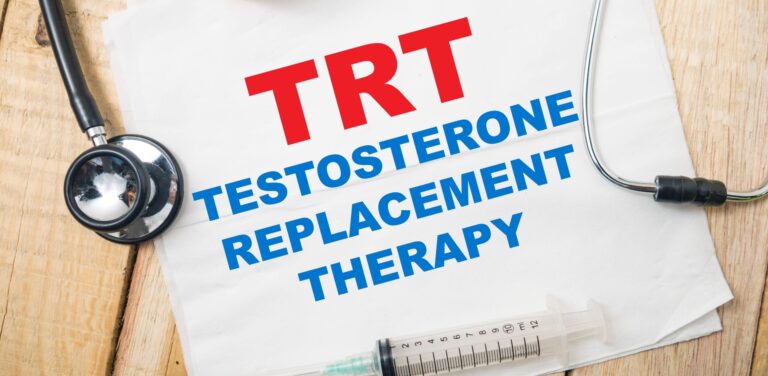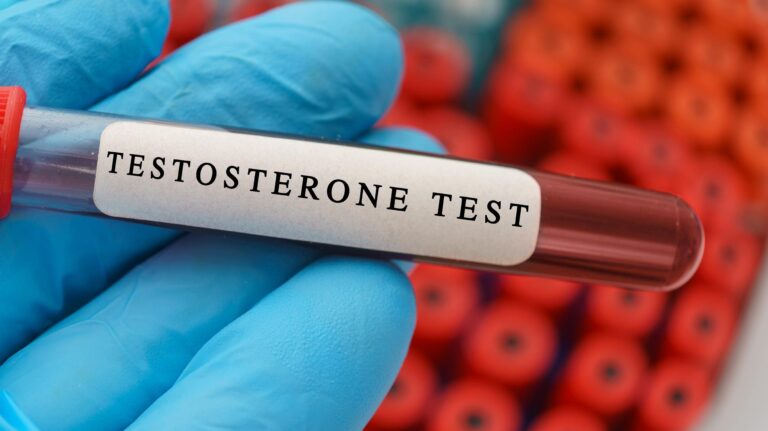
Testosterone replacement therapy (TRT) has emerged as a prominent treatment for individuals experiencing testosterone deficiency syndrome, commonly referred to as ‘low T’ or male menopause. In the UK, TRT is delivered through various medical channels, including gels, creams, and injections, addressing symptoms such as fatigue, decreased libido, and muscle weakness. Testosterone Replacement Therapy (TRT) in the UK is increasingly acknowledged for its ability to alleviate these symptoms by replenishing hormone levels to their optimal range.
The process of initiating TRT involves a thorough medical evaluation to diagnose low testosterone levels accurately. Prospective patients are educated on the potential benefits and risks associated with the therapy. Moreover, TRT in the UK is not only a matter of treatment but also of consideration regarding the decision to pursue therapy in public healthcare settings, like the NHS or through private healthcare providers.
As the conversation around TRT grows and the treatment becomes increasingly accessible, men across the UK are seeking information on this key health issue. TRT UK: Testosterone Replacement Therapy (TRT) in the UK provides valuable insights into how testosterone can influence general wellbeing and the importance of a balanced approach when considering testosterone replacement as a long-term healthcare plan.
Understanding Testosterone and Its Roles in the Body
Testosterone is crucial not only for sexual health but also for general well-being, influencing everything from muscle mass to mental sharpness. Understanding how testosterone functions can shed light on the wide-ranging effects of hormone imbalances.
Hormonal Health and Testosterone Levels
Testosterone is a vital male hormone significantly affecting hormonal health. Normal levels are essential for fostering a healthy libido, optimising energy levels, and maintaining concentration. Testosterone plays a pivotal role in the development of male sexual characteristics and contributes significantly to maintaining lean muscle and regulating fat mass.
Testosterone Deficiency and Hypogonadism
When testosterone levels fall below normal, a condition known as hypogonadism or low testosterone can emerge. Symptoms of this deficiency can be broad-ranging, including fatigue, weight gain, reduced erectile function, and a decrease in mental focus. Hypogonadism can also cause emotional changes, such as low mood, and physical concerns, such as reduced bone strength and increased body fat.
Ageing and Hormone Imbalance
As men age, they often experience a natural decline in hormone levels, sometimes referred to as male menopause or andropause. This can lead to hormone imbalances, not just involving testosterone but also oestrogen and other hormones. The imbalance may result in reduced muscle mass, changes in sleep patterns, night sweats, and an increased risk of heart attacks and strokes. Hormone therapy, including testosterone replacement, can be used to alleviate these symptoms and restore hormonal balance.

Diagnosing Low Testosterone
Identifying low testosterone levels, often termed ‘low T’, involves a clinical diagnosis based on blood tests and assessment of symptoms. This lays the foundation for considering Testosterone Replacement Therapy (TRT) as a treatment option.
Blood Tests and Diagnosis
In assessing for low testosterone, healthcare professionals rely on blood tests. It is recommended that tests occur in the morning, when testosterone levels tend to be highest, to ensure accuracy. To confirm a diagnosis of testosterone deficiency, the NHS guidelines suggest that individuals undergo two separate blood tests, due to natural fluctuations in testosterone levels throughout the day.
For males, the target range for testosterone levels is typically between 8.64 to 29 nmol/L. A diagnosis of low testosterone may be considered when levels fall below this range. An accurate diagnosis often also requires considering symptoms and medical history since levels can vary widely among individuals.
Understanding Testosterone Levels
Testosterone levels naturally decline with age, and it’s crucial to understand what is considered low. Clinicians interpret the results of a low testosterone test within the context of overall health and symptoms presented. Symptoms can include reduced libido, fatigue, and muscle weakness, among others.
When reviewing blood test results, healthcare providers look for:
- Total Testosterone (TT): Direct measurement of testosterone in the blood.
- Free Testosterone (FT): Portion of testosterone not bound to proteins, which represents the biologically active form.
If testosterone levels and symptoms suggest a deficiency, further investigations may be warranted. For instance, low testosterone with low Luteinizing Hormone (LH) and Follicle Stimulating Hormone (FSH) or increased prolactin could indicate potential pituitary gland issues. It’s important to follow these diagnostic steps to ensure a comprehensive evaluation and appropriate treatment pathway.
Testosterone Replacement Therapy (TRT) in the UK
Testosterone Replacement Therapy (TRT) is an established treatment for men with clinically low testosterone levels. It offers several administered forms, including injections and gels, and can be accessed either through the NHS or private clinics.
TRT on the NHS
The National Health Service (NHS) provides TRT under specific conditions, as diagnosed by general practitioners (GPs) or endocrinologists who follow strict guidelines. To qualify for TRT on the NHS, patients must exhibit symptoms of low testosterone and have blood work confirming deficient levels on two separate occasions. Initial treatment options may include testosterone gels or injections, with follow-up assessments to monitor the response.
Private TRT Treatment
Patients looking for more immediate or comprehensive treatment options may opt for private TRT treatment. Private clinics typically offer a broader range of treatment options and may present an alternative for individuals who do not meet the NHS criteria or wish for a personalised treatment plan. These clinics can provide different modalities of testosterone replacement, such as creams, gels, and injections, often with more flexible dosing schedules and adjunct therapies like HCG (human chorionic gonadotropin). They may also offer remote consultations for added convenience.
Treatment Options:
In the UK, individuals considering Testosterone Replacement Therapy (TRT) have a variety of treatment options that are tailored to meet specific needs and preferences.
Injections
Injections are a common form of TRT, where testosterone is directly administered into the muscle. Typically, injections are carried out every two to three weeks, but some formulations can last longer.
What is Sustanon?
Sustanon is a widely used form of injectable testosterone that combines four different testosterone esters. It’s designed to provide a rapid boost of the hormone followed by a longer release period. Patients should understand that Sustanon must be prescribed and its administration frequency should be determined by a healthcare professional.
Supplements
Supplements encompass a range of products, including testosterone gel and cream. This method provides a steady release of testosterone and is an alternative for those seeking non-invasive treatment options. It is important to note that any form of testosterone supplement should only be used under medical supervision to ensure safe and effective treatment.

Benefits and Risks of Testosterone Replacement Therapy
Testosterone Replacement Therapy (TRT) is a treatment aimed at addressing the symptoms of low testosterone, to improve the quality of life for those affected. It offers various benefits but also has potential risks that need careful consideration.
Improving Quality of Life
Libido and Energy: TRT can significantly enhance sexual function, including libido, and increase overall energy levels. Patients may experience a noticeable uplift in their sex drive and find they have a greater capacity for physical activities.
Concentration and Mood: Treatment may also improve concentration and reduce feelings of depression. For some individuals, this results in better mental clarity and a more positive outlook on life.
Muscle Mass and Fat Distribution: TRT can increase lean muscle and lead to a more favourable muscle-to-fat ratio. This is often accompanied by a reduction in fatigue and an improvement in the body’s overall wellbeing.
Bone Density: Enhancing bone mineral density (BMD) is another key benefit, which can reduce the risk of osteoporosis, especially relevant as men age.
Potential Side-Effects and Risks
Prostate Health: There is an associated risk of stimulating noncancerous growth of the prostate and potentially exacerbating existing prostate cancer.
Cardiovascular and Liver Function: TRT might influence cardiovascular health and liver function, thus requiring regular monitoring to avoid serious complications.
Fertility and Sleep Disturbances: Some men may experience a decline in sperm production affecting fertility, along with sleep disturbances such as worsening sleep apnea.
Psychological Effects: While TRT can generally improve mood, it may also contribute to mood swings or increased aggression in some individuals. Monitoring mental health is an important aspect of the treatment plan.
Other Metabolic Effects: The therapy also has the potential to affect metabolic conditions like type 2 diabetes, which could be beneficial or detrimental, depending on individual patient factors.
Lifestyle, Environment, and Testosterone Levels
Testosterone levels in men can be significantly influenced by lifestyle choices and environmental factors. This section explores how exercise and diet, as well as broader environmental influences, can impact hormonal balance.
Impact of Exercise and Diet
Regular physical activity bolsters testosterone production, notably resistance and high-intensity interval training. A balanced diet that includes lean protein, healthy fats, and limited refined sugars also plays a crucial role. Conversely, excessive alcohol consumption can lead to lower testosterone levels, and may contribute to the risk of heart attacks and strokes.
Environmental Factors Affecting Hormone Balance
Men are exposed to various environmental factors that could disrupt hormonal balance. For example, stress is a known contributor to reduced testosterone levels and can affect mental health. Long-term exposure to certain environmental pollutants and endocrine-disrupting chemicals has been linked to hormonal imbalances, necessitating awareness and mitigation where possible.
Navigating Treatment: Support and Resources
Embarking on Testosterone Replacement Therapy (TRT) in the UK involves a structured approach to treatment, with specialist doctors guiding the therapy and dedicated patient support services offering assistance through the journey.
Working with Specialist Doctors
When considering TRT, working with specialist doctors such as endocrinologists or physicians experienced in hormone replacement is essential. These medical professionals can provide accurate prescriptions, and monitor the patient’s hormone levels throughout the treatment process. They usually initiate therapy by conducting a comprehensive evaluation including a hormone quiz or assessment, ensuring that testosterone levels are accurately measured and the need for TRT is well-established.
Testosterone Therapy and Men’s Mental Health
Testosterone replacement therapy (TRT) is increasingly recognised for its role in men’s mental health, particularly in cases where testosterone levels are deficient.
Testosterone’s Role in Mental Wellbeing
Testosterone is known to influence mood and wellbeing. Low levels of this hormone are often found in men experiencing depression and anxiety, conditions that can affect day-to-day life and overall happiness. A balanced testosterone level is important for maintaining mental stability, reducing feelings of stress, and promoting a positive state of mind.
Addressing Mental Health Challenges with TRT
The administration of testosterone replacement therapy can have beneficial effects for men suffering from mental health challenges. For those with low mood often linked with low testosterone, TRT may contribute to an improvement in symptoms. It should be approached with careful consideration and under the guidance of a healthcare professional, as it may alleviate the emotional instability attributed to hormonal imbalance.
Frequently Asked Questions
The following subsections address common enquiries regarding testosterone replacement therapy in the UK, focusing on legality, side effects, costs, and its use in bodybuilding.
What are the legal requirements for obtaining testosterone replacement therapy in the UK?
In the UK, testosterone replacement therapy (TRT) is a prescription-only medication. It must be prescribed by a healthcare professional who has confirmed a diagnosis of low testosterone through blood tests and symptom evaluation. Patients may receive TRT through NHS services or private healthcare providers.
What are the potential side effects associated with testosterone replacement therapy?
Testosterone replacement therapy can lead to various side effects, which may include acne, sleep apnea, enlarged breasts, and limited sperm production. The British Society of Sexual Medicine offers guidelines that address these concerns and suggest monitoring for cardiovascular risks and prostate health.
Can testosterone replacement therapy be used for bodybuilding purposes in the UK?
While TRT is legal for treating diagnosed testosterone deficiency, using it solely for bodybuilding or performance enhancement is not sanctioned by UK law. TRT prescriptions are strictly for medical purposes, and its use should be overseen by a healthcare professional to prevent abuse and health risks.
How Much does Testosterone Replacement Therapy Cost?
At the VitaminSuite we offer an initial consultation for Testosterone Replacement Therapy. This consultation costs £200 and includes a blood test. Before any testosterone injections can be administered blood tests must show insufficient testosterone levels in the body.
The results of the blood tests will be discussed with Dr Haris Akhtar, and if levels are below the optimum amount, we can proceed with Testosterone Replacement Therapy (TRT).
The cost of TRT then depends on the requirements of each individual patient. The cost starts at £25 per week.
If you would like to arrange a consultation for TRT at The Vitamin Suite in Burnley, Please contact us on 0333 772 1630 or email us at admin@vitaminsuite.co.uk




